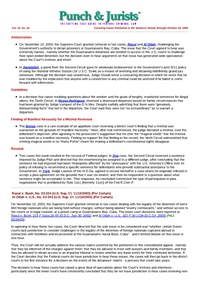The defendant in this case argued that the district court abdicated its judicial function under the Mandatory Victims Restitution Act of 1996, 18 U.S.C. § 3664, by setting the restitution schedule in accordance with Bureau of Prison policies. A majority of the panel disagreed. It wrote:
"We disagree. The …
Here the Court held that a portion of the Religious Land Use and Institutionalized Persons Act (RLUIPA) violated the Establishment Clause and was unconstitutional because it fostered excessive involvement of the Government in religion.
Here, the Court held that a portion of the three-year old Religious Land Use …
Here, notwithstanding the language contained in Application Note 1(a) of U.S.S.G. § 3E1.1 (which states that “a defendant who falsely denies, or frivolously contests, relevant conduct that the court determines to be true has acted in a manner inconsistent with acceptance of responsibility”), the Third Circuit held that provision …
Defendant was charged with kidnapping resulting in the death of his ex-wife in violation of the Federal Kidnapping Act, 18 U.S.C. § 1201. Defendant filed a motion for judgment of acquittal, pursuant to Fed. R. Crim. P. 29.
Several days after her disappearance, defendant's ex-wife's car was found abandoned …
The petitioner in this case, a federal inmate, sought relief under the Religious Freedom Restoration Act (RFRA) (42 U.S.C § 2000(bb)) from what he said was the BOP’s improper interference with his rights to practice the Wiccan religion (which the Court described as “a polytheistic faith based on beliefs …
Here, reversing two lengthy decisions by Judge Scheindlin, the panel gave its wholesale endorsement to the Government's post-9/11 policy of using the Material Witness Statute to arrest and detain indefinitely grand jury witnesses.
Last year, in two important decisions that were highly critical of the Government’s use (or …
This is one of those decisions that raises troubling questions about the wisdom and the goals of the current U.S. policy that mandates lengthy periods of incarceration for illegal Mexican immigrants who are caught in this country - without any consideration given either to the destructive effects that such …
In the case the Government notified the defense that it intended to call a retired police detective to testify to certain events related to the murder of one person and the shooting of another. The government sought to admit, through the detective, a statement made to him by the …
Here the Court reversed the district court's determination that there was a "manifest necessity" to declare a mistrial, holding that the finding was unsupported by the record and was based on Harry Potter "magical words".
The defendant in this case was charged with making threats in interstate commerce, …
In this case, the defendant and the Government reached agreement on a plea agreement that provided for a 15-year term of imprisonment. When the agreement was presented to Judge Lawson, he refused to accept it, stating that it was too lenient. After all efforts to persuade the judge to …
Here the Court reversed a sentence imposed by Judge Platt and recused him from the resentencing, holding that the sentence he had imposed had been “improperly affected” by his “annoyance” with the U.S. Attorney’s policy of not recommending departures.
For the second time in the last few years, …
Defendant was charged with carjacking resulting in death. The United States Attorney General filed a notice of intention to seek the death penalty. Defendant moved to dismiss the death penalty charges and challenged the government's right to present certain evidence in support of them.
Defendant's motion presented a serious …
